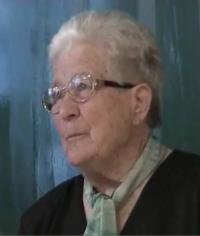A: No, for theft it was very severe
Q: Did you have any friends in the camp?
A: we weren’t allowed to look at anyone, enemies, enemies, my darling. Even my sister, and we couldn’t even look at each other or say anything, not a word. I don’t know with whom I talked to that night but one Russian fellow, a Russian, we would climb uphill and they would go downhill. And that Russian, kind person, a small paper, with two words on it, he gave it to a girl who was going to the field. They killed him, we never saw him after that, they killed him, big dogs tore him apart. You couldn’t do anything, friends, my child, hehe, friends, yes. There were no friends there.
Q: Were you with the Jews?
A: The Jews were…yes, yes, not very much, the Jews were like this. For example Jews, like us, marries a Bosnian or a Muslim, so they were “mixed”, women…Christians, Christians and Jews were of another religion. Then they would come to camp with small children…when they brought them they would bring so many of them, big, long train, filled up from Hungary, most of them were from Hungary, and rich people, they took everything from there, everything, gold and everything, the Germans that’s why the war went on for so long. My dear, when they brought those children and people, their mothers were Christians…they killed the kids. Burned them. If the dad was christened they kept their father’s religion. They didn’t harm those children. And if the mother was they’d kill the mother and the children. The Jews were always burned. They burned in big chambers filled with gas, how do you call it…gas, gas. Yes, gas and the furnace. The smoke would come out of that furnace in the morning, a big cloud would form in the sky. Then they’d burn them. Poor children, they cried and screamed, what can you do, you can’t help the kids, you have to let it go.
Q: How long were you in the camp?
A: seventeen months. In the camp and prison and I got my pension for seventeen months.
Q: and your family, were they in the camp?
A: my family, in the camp? Yes, my darling, my sister was in the camp with me for awhile. And she went to the hospital. She was two years younger than me. I was born in ’26, she ’28. And she got typhoid. And she went to the hospital and we never saw each other again. Ever. She died in someone else’s home. In Prague. Czech Republic capitol. And my two brothers were in the camp. But not with me, with my husband, my late husband was also in the camp in Dachau, all my brothers were there. Four of us taken from my mother. How could she feel, all of us kids gone.
Q: you were the only one who survived?
A: I was the only one, all three of them…yes…forgive me for crying, yes…I’m happy to tell my story but it’s hard.

